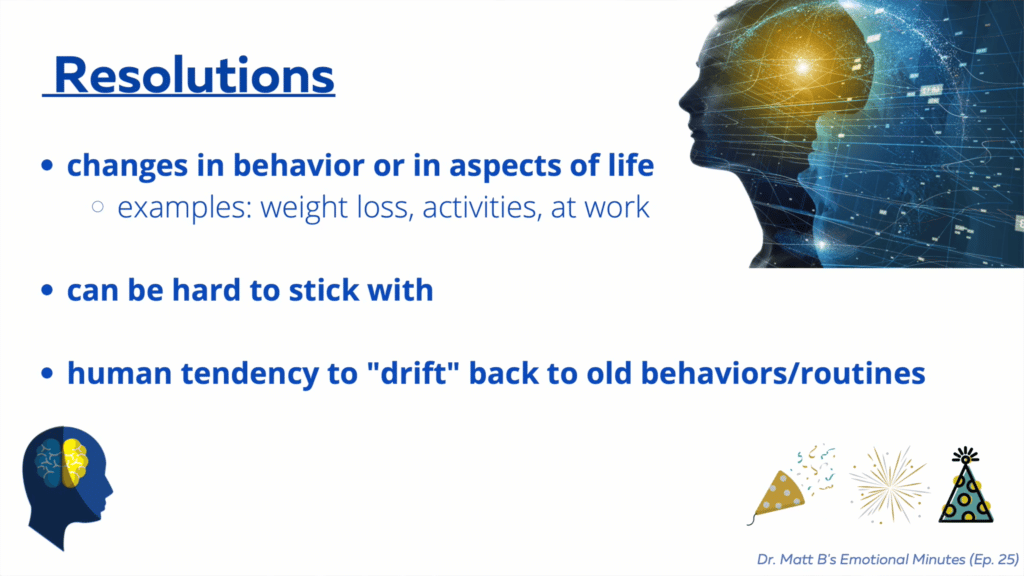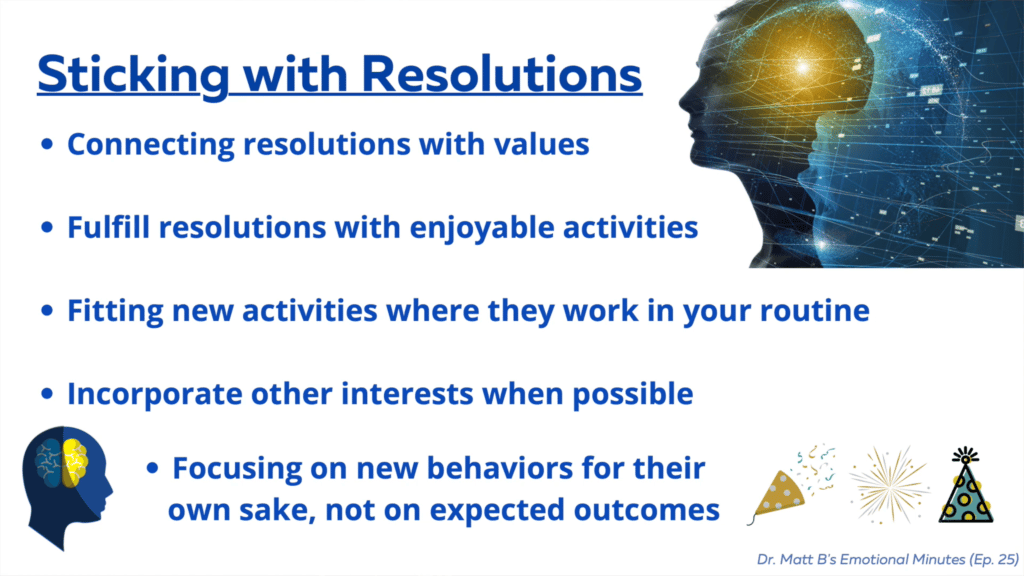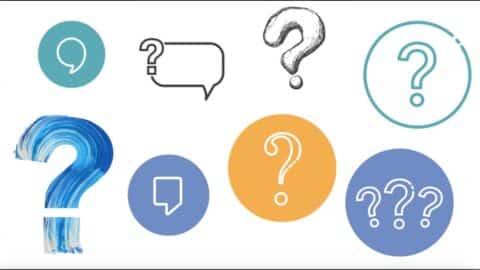Resolutions are decisions to initiate some sort of behavior change or improve conditions in one’s life. Resolutions are really popular at the beginning of the year (e.g., “new years resolutions”). How can I stick with new years resolutions?
However, resolutions can be very difficult to stick with and to solidify into one’s routine in the long-term. The good news is that there are ways to help increase the chances that a resolution or new behavior change will stick.
This clip discusses why resolutions can be hard to maintain. There are also ways to help continue engaging in new behaviors to increase the chances they become part of our long-term routines.
Welcome back, I’m Dr. Matt B, and these are your Emotional Minutes. We are talking about new years resolutions or resolutions in general. Resolutions are basically a decision that somebody makes in their life to incorporate some sort of behavior into their routine or to make some positive change in their life. For me, it’s a resolution that I’ve had for a while: finding more time to play my guitar. With work, life, and things like that I haven’t really dedicated much time to my resolution lately.
Why Can’t I Keep my New Years Resolutions?
We just hit the new year’s mark of 2021 and new years resolutions are really popular right now. However, resolutions are hard to keep alive or to incorporate into your life in the long term. Part of the reason for that is something that all humans experience. What we call drift. There is a natural tendency to drift back to old habits or old routines.

But don’t give up now! The good news is that there’s a couple things you can do to help increase the chances that your new years resolution will stick around and become part of your routine.
Use Your Values and Goals
The first thing is how you choose your resolution. Usually, it can be really effective to choose a resolution based on something you value or want to get out of your life. Sometimes people will make resolutions that are positive but might be arbitrary. For example, they want to lose weight, or they want more social interaction. Both are things that a lot of people want in their lives. So how do you stick with it?
One answer is to tie the goal to your values or what you want to get out of life. In the case of losing weight, you can say you will lose weight because you value being a good parent and want to be around for your kids longer. From there, you can say that working out will help you have better physical health and live longer. That’s just one example.
Find Ways to Enjoy Your New Years Resolutions
Another thing that can be helpful is tying your resolution to something that you really enjoy. If your new year resolution is to get more exercise in order to be healthier, you might go to the gym. However, a lot of people really don’t like going to the gym. They may not enjoy being in that setting, or they don’t enjoy a structured, regimented fashion. One of the things that can be helpful is making that resolution more enjoyable.
So, if you want to improve your physical health, how can you do that while doing something you enjoy? If you really like hiking, go for a five-mile hike twice a week to get in shape. Or, if you like being social, then join a local sports league. That way, you get some physical exercise from a team sport and you get to interact with others.
Make Your New Years Resolutions Part of Your Day
You can also increase the chances of continuing to engage in your resolution by fitting it into your routine. Put it in places that you know you can get done or in places that work for you.
For example, with my guitar playing, I’ve started to do it right when I get done with work. If I’m working from home or first thing when I walk in the door, I pick up my guitar and practice. I do this because I know that otherwise I will get distracted by other things. It’s hard to decide to practice when I’ve been distracted by looking online, watching TV, or something like that. Whereas if it’s the first thing I do after work, then I know that will boost the chances that I’ll actually do it.
Use Your Other Interests
Incorporating other interests where possible is also a helpful strategy. If your New Year’s resolution is to exercise more, do it while listening to an audiobook or podcast on something that interests you. Or if you want to have more social interaction, go to events that involve your hobbies. While at the events, talk with people there to learn more about your shared interest. Doing this means that, as you’re engaging in the new behavior, you’re associating it with something that you already enjoy.
Cognitive or Mental Strategy
The last thing that I’ll say that can be helpful is what we call a cognitive or a mental strategy. This entails changing how you view the activity you’re trying to incorporate or the improvement you’re trying to make. What a lot of people do is focus on the end game or the final result. So, if it’s getting more exercise to lose weight, they’ll think about how many pounds they might lose.
Do The Resolution For the Sake of the Resolution
But what can happen is this can start to become overwhelming and it may seem unobtainable. If this happens, start to engage in the behavior for the sake of the behavior itself. Try to focus on the task and the benefits of it in that moment. Notice the sense of accomplishment you get while doing it.
By doing this, you become more engaged in the task and the task becomes more appealing. This means you are more likely to try to complete it again later. That will increase the chances that you’ll really stick with it. You may still get that benefit from thinking of the end game, but you aren’t focusing on it too much. Instead, you’ve enjoyed the task for what it is.




